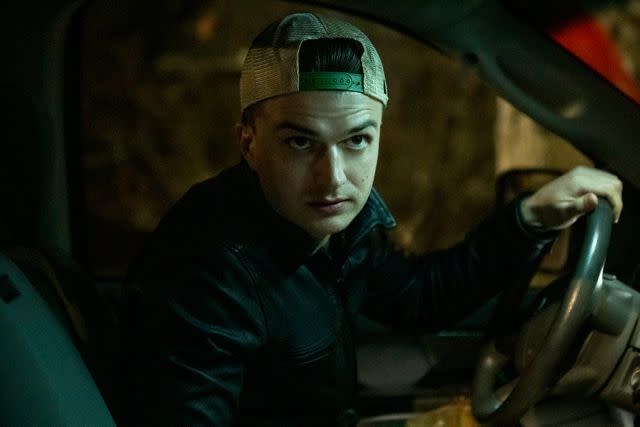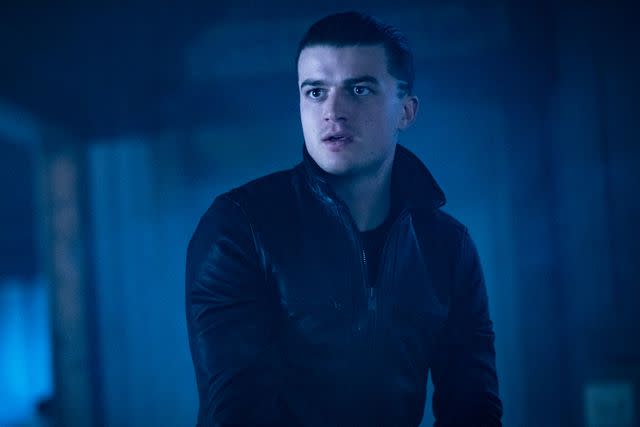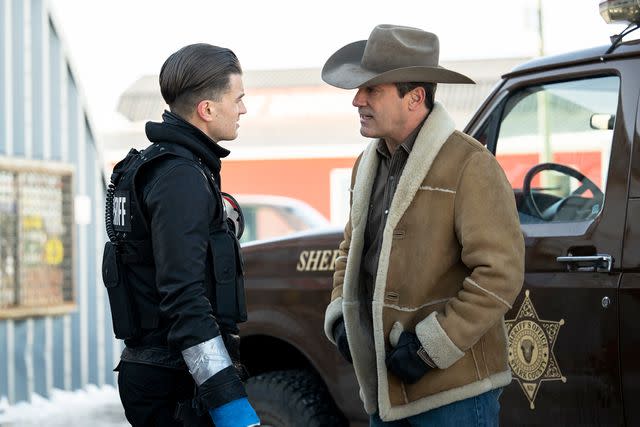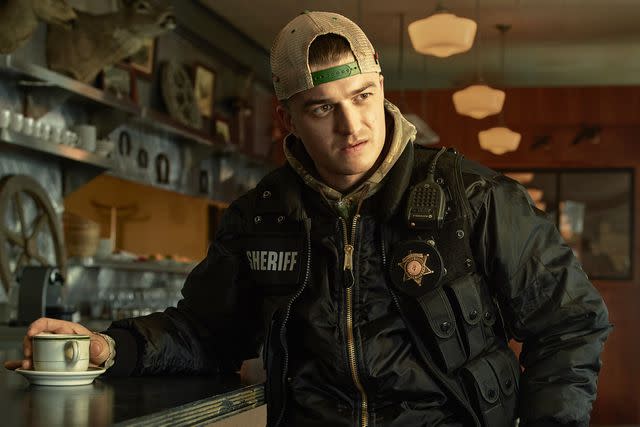Joe Keery says he 'absolutely destroyed myself' stumbling around blindfolded in the “Fargo” finale

Plus, what the actor thought about that "Stranger Things" reference in episode 4.
Joe Keery suffered some painful side effects of stumbling around blindfolded and covered in blood while shooting the Fargo season 5 finale.
The actor — who stars as the bratty and insecure Gator Tillman in the Emmy award-winning FX limited series — reveals to Entertainment Weekly that he bonked his head several times while attempting to navigate through frozen tundra and small tunnels after Gator is blinded by a mythological creature named Ole Munch (Sam Spruell) for his season-long sinning.
“I absolutely smacked my head a couple times doing that, oh my God,” he recalls. “Actually, the time that I smacked my head the worst I wasn't even blindfolded. We were rehearsing it and I was like, ‘Okay, and then I'll be here,’ and then absolutely destroyed myself. But honestly, once I had the blindfold on, I was extremely careful to make sure I wasn't gonna smack my head.”

Michelle Faye/FX
Joe Keery as Gator Tillman in 'Fargo'Having to rely on only his remaining senses also made Keery feel closer to Gator in the scene. “You don't know where the camera is. You feel alone in the world,” he says. “And that's how the character is feeling at that moment. He's just lost. The lights are out. It makes it easier — you don't have to act as much."
Stepping into the bloody, Midwest mayhem of Fargo may seem like a major departure for Keery, who is most commonly known for playing the nail bat-wielding hero Steve Harrington on Stranger Things, but the actor has always sought out roles that push boundaries within his career. His previous credits include starring as a rideshare serial killer in Spree, an escaped-convict-turned-bank-robber in Marmalade, and, in Fargo, a clumsy sheriff living in the shadow of his abusive father Roy (Jon Hamm). When he's not performing on screen, Keery's also releasing TikTok-dominating songs under the moniker, Djo.
EW caught up with Keery to discuss working alongside Juno Temple and Jon Hamm, picking up the nail bat again, and why he believes that Gator received the perfect ending on the show.

Michelle Faye/FX
Joe Keery in 'Fargo'ENTERTAINMENT WEEKLY: When I spoke with series creator Noah Hawley last year, he described Gator as someone who, had he had any father other than Roy, would’ve actually been a kind soul. Do you believe that?
JOE KEERY: Yeah. I think it's just nature versus nurture, really. It's this horrible cycle because he's got no love, he tries even harder to seek this approval from his father who has been absent. The harder he tries, the worse it gets, so he lashes out at other people and tries to belittle them and put them beneath him. He's so pathetic, but he has no idea. It allows for this really fun unfolding for me as an actor but then also for the audience. It's a character that you're first like, "Oh my gosh, I can't stand even looking at this guy," and then slowly you end up feeling bad for him.
What was it like working opposite Jon Hamm?
Jon is so giving and he also has a real sense of relaxation that I admire in a performer — you can really tell that he’s done the reps. He's been an actor for so long and the amount of work that he had to do on Mad Men is staggering to me. It was like a masterclass being able to watch that guy work.

Michelle Faye/FX
Joe Keery and Jon Hamm in 'Fargo'Juno Temple’s character Dot nearly clobbers Gator with a nail bat — an object often associated with your Stranger Things character Steve Harrington — during their Halloween brawl in episode 4. What was your reaction to reading that moment in the script?
The serendipity of that whole thing with Stranger Things… it was so funny. I mean, I didn't even say anything. I was like, "Oh, it’s a nail bat. That’s like Stranger Things." We didn’t even talk about it.
Do you think Gator ever truly wanted to capture Dot?
I do. I think he was conflicted about it, but I actually think it's maybe he's just too inept [to do it]. The scene that made me feel that way is the fact that he does not help her at the end of the day. I love that scene with Juno [when Dot is held hostage by Roy] in the barn — there's a chance for change and I actually enjoy that he rejects it, because you can see the amount of power and control that Roy has over him.
Related: Fargo creatives talk casting 'menacing' Jon Hamm, Juno Temple, and more in season 5
Why does he refuse to help her in that scene?
Because if he were to believe [her], then it's ego death. Everything that he has come to believe — every decision he's ever made in his entire life — then is [wrong, and] he is afraid to be dumb. And the ultimate way to be an idiot is if he's allowed his father to really take control and advantage of him. I think that's just anyone’s fear. He's just a 12-year-old kid and doesn't want to be dumb.
Check out more from EW's The Awardist, featuring exclusive interviews, analysis, and our podcast diving into all the highlights from the year's best in TV.

Frank W Ockenfels III/FX
Joe Keery in 'Fargo'So why then does he flip on Roy in the end?
Well, the information that's revealed about his mother, I think that has something to do with it, but that's up for people to determine on their own.
Do you think Gator believed that his mom was still alive?
I think that he thought that she was alive. I think, at least, that he was trying to convince himself of that.
Related: Fargo creator weighs in on that Stranger Things parallel in episode 4
What were your thoughts on Gator being blinded by Ole Munch for his transgressions?
The season is about debt. It's about actual fiscal debt, but then it's about spiritual debt with Ole Munch. And it's about what a father owes a son, a son owes a father, a husband knows a wife, a wife owes a husband — and he makes these decisions and he pays the price. And that's life. I really liked the ending for the character. It took me a second to understand it, but I love that he's kind of back to square one. He's made these mistakes, he's paid the price for his eyes, and now he's okay.
Now, as a blind man, he must move forward and hopefully be able to see people — and himself — for who they are. The last scene of the show is a very hopeful scene about forgiveness and about allowing yourself to be the first person to do that. I think it's also a hopeful ending for Gator in a way that — despite his upbringing, and despite the loss, and despite his family, and despite all this hardship, and horrible things that he's gone through — there is still hope for him. There's a chance for some sort of life after everything that you've been through.
Fargo is available to stream on Hulu.
This interview has been edited for length and clarity.
Read the original article on Entertainment Weekly.
